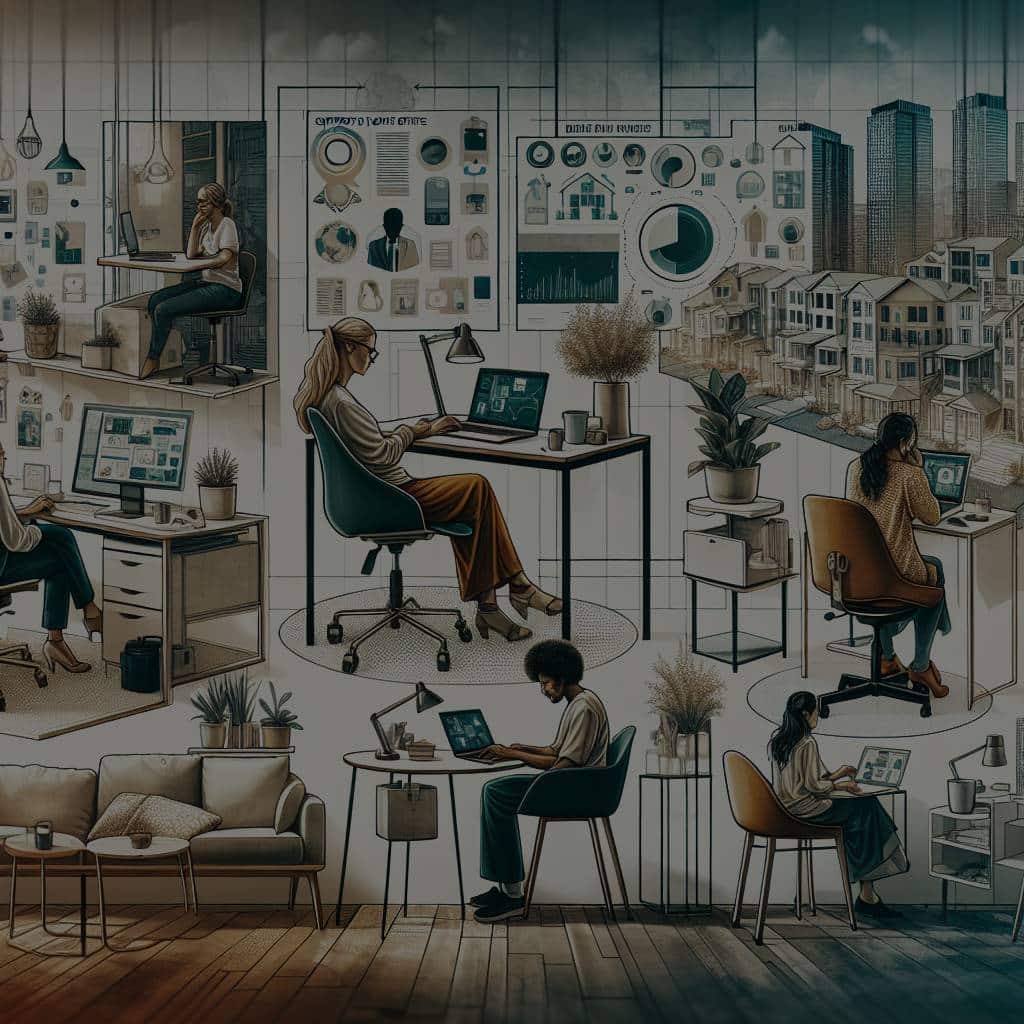What Are the Best Practices in Real Estate for Supporting Work-from-Home Trends?

In the past few years, the world experienced a massive shift in work dynamics due to the unfortunate onset of the COVID-19 pandemic. This global crisis forced numerous companies to transition their employees from traditional offices to remote work setups, popularly known as ‘work-from-home’. This practice, initially perceived as a temporary measure, has now evolved into a new standard in the professional landscape.
Businesses worldwide have started recognizing the manifold benefits of a hybrid work model, blending remote and in-person work requirements. However, the shift to remote working has presented its own unique challenges, particularly concerning real estate.
Sujet a lire : How to Navigate Real Estate Investment in Conservation Areas Within the UK?
In this light, we delve into the best practices in real estate that are instrumental in supporting and facilitating the evolving work-from-home trends.
Adapting Residential Spaces for Work-from-Home
The shift from traditional office spaces to the comfort of home brought a new set of necessities. Employees now needed a conducive environment within their homes capable of fostering productivity. But, what does this entail for the real estate industry?
Avez-vous vu cela : What Is the Role of BIM Technology in Reducing Construction Delays in Real Estate Projects?
Residential real estate was mostly geared towards relaxation and downtime, with a minimal focus on work. However, since the pandemic, the demand for residential spaces that accommodate home offices has surged. Potential homebuyers and renters now seek properties that offer dedicated workspace – a room or area designed for work-related activities, equipped with essential amenities such as high-speed internet connectivity, ample lighting, and noise-free surroundings.
Real estate developers and agents must acknowledge this new demand and adapt their construction and marketing strategies accordingly. This might mean designing properties with a dedicated workspace or remodeling existing spaces to suit working needs.
The Rise of Hybrid Spaces
With companies increasingly adopting a hybrid work model, the lines between home and office are blurring. This shift calls for the creation of ‘hybrid’ spaces, a more flexible real estate solution that caters to both residential and commercial needs.
Hybrid spaces can be conceived as properties that combine the elements of both residential and commercial real estate. This could include residential complexes equipped with co-working areas, business centers, or conference rooms. This approach not only caters to the needs of remote workers but also stimulates a sense of community, preventing isolation that can often come with working remotely.
It’s high time for real estate developers and investors to capitalize on this emerging trend and transform traditional residential blocks into spaces that accommodate the hybrid work lifestyle.
Embracing Technology
Technology is undeniably a driving force in the transition to work-from-home practices. With a major portion of the workforce operating remotely, companies are relying heavily on digital tools and platforms to facilitate communication and work processes.
Consequently, the demand for tech-integrated homes has witnessed a significant rise. Today’s remote workers seek homes equipped with the latest technology – high-speed and stable internet connection, smart home systems, and other tech features that aid in performing professional tasks seamlessly.
For the real estate industry, this implies a shift towards building ‘smart homes’, focusing on incorporating tech features that support remote work. Developers need to integrate technology at the construction stage itself, while real estate agents should be able to market these features effectively to potential homebuyers.
Building Communities for Remote Workers
One of the challenges of working remotely is the potential feeling of isolation. Remote workers often miss the social interaction and camaraderie that come with a physical office environment. This is where real estate can play a pivotal role.
By creating communities specifically tailored for remote workers, real estate developers can simulate the social advantages of a traditional office. This could mean developing residential complexes that offer shared workspaces, organizing community events, and creating spaces that encourage interaction among residents.
These purpose-built communities for remote workers can help in fostering a sense of belonging, thereby making remote work more appealing and sustainable in the long term.
Reimagining Commercial Real Estate
While the trend of work-from-home is on the rise, it doesn’t necessarily spell the end for commercial real estate. Instead, it calls for a reimagining of these spaces. Companies will still need physical offices, but their requirements might drastically change.
The concept of office space is evolving from a place of work to a venue for collaboration and innovation. This indicates a shift from traditional office layouts to more flexible and collaborative spaces. The real estate industry needs to adapt to this change and remodel commercial properties that facilitate these new requirements.
Moreover, as companies are increasingly adopting a distributed workforce model, there’s a growing need for smaller, satellite offices. Real estate developers must recognize this trend and adjust their strategies to accommodate such requirements.
The transition to remote work is a transformative process, affecting various aspects of our lives. It necessitates a reimagining of the way we perceive and utilize real estate. By adapting to these changes and embracing new trends, the real estate industry can provide impactful solutions that support remote work and drive the future of work.
Leveraging State and Local Regulations
In light of the growing work-from-home trend, it becomes essential that state and local regulations align with these changes. Regulatory bodies have a crucial role to play in shaping the future of real estate. They can create an environment conducive for real estate developers to explore and implement new construction strategies that cater to the evolving needs of remote workers.
Compliance with state and local building codes and regulations can often pose challenges for developers. For instance, restrictions on the ratio of commercial to residential spaces in a property might hinder the development of hybrid spaces. Therefore, it’s crucial to reassess these regulations in the context of the current work-from-home trend.
Moreover, local governments can incentivize developers to create housing options that support remote work. This could involve providing tax benefits or subsidies for creating dedicated workspaces within residential properties or incorporating technology upgrades that facilitate remote work.
Government agencies and developers should work together to identify and overcome regulatory hurdles. This collaboration can pave the way for innovative real estate solutions that accommodate the needs of a predominantly remote workforce.
The Future of Real Estate in the Work-from-Home Era
As companies continue to embrace the hybrid work model, it is clear that the work-from-home trend is here for the long term. This shift in the work paradigm has made a significant impact on the real estate industry and is reshaping the way we think about work and living spaces.
The rise of remote work has instigated a transformation in the residential real estate sector, with an increasing demand for homes that accommodate work needs. To meet this demand, developers must shift their focus towards creating residential properties that offer dedicated workspaces, equipped with the necessary tech amenities.
Moreover, the concept of hybrid spaces is gaining traction. These spaces, which combine elements of residential and commercial real estate, cater to the need for flexibility in work and living arrangements. By transforming traditional residential blocks into hybrid spaces, developers can provide innovative solutions that accommodate the hybrid work lifestyle.
Furthermore, the real estate industry has a pivotal role in addressing the social challenges of remote work. By building communities specifically tailored for remote workers, developers can simulate the benefits of a traditional office environment and foster a sense of belonging among remote employees.
Finally, while the demand for commercial real estate might decrease with the rise of remote work, there’s still a need for physical offices. However, these spaces need to be reimagined to facilitate collaboration and innovation, aligning with the needs of a distributed workforce.
In conclusion, the transition to remote work presents both challenges and opportunities for the real estate industry. By embracing these changes and innovatively adapting to the evolving needs of the workforce, the real estate industry can help shape the future of work and provide a supportive environment for the work-from-home trend.
